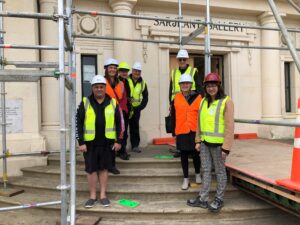05 Oct Whanganui Sarjeant Gallery redevelopment: Reopening date is planned for mid-2023.

From left Rāwiri Tinirau, Catriona McKay, Jillian Karl, Ernie Dickinson, Reg Kitson, Marion Gibbard and Gaye Batty on a stakeholders’ guided tour of the Sarjeant Gallery construction site.
The Sarjeant Gallery Redevelopment Project is now well under way, having reached this stage through the dedicated efforts of many people and organisations who have contributed towards seeing it restored and redeveloped.
The redevelopment of the 100-year-old Sarjeant Gallery involves earthquake strengthening the existing heritage building and construction of a new wing – Pataka o Sir Te Atawhai Archie John Taiaroa, named in honour of the much loved Whanganui kaumātua.
The tremendous investment and support means there is great interest in the project’s progress and so an important part is maintaining a connection to the stakeholders through communication and engagement.
Contractor McMillan and Lockwood has estimated the construction period to be 32 months from June this year, and with the necessary four-month fit-out and testing period on top of that, the Sarjeant’s reopening date is planned for mid-2023.
We’ve just completed our last “hard hat tour” of the Gallery, at this stage of the project.
While logistically it hasn’t been possible to take public tours through the working construction site, we’ve taken 17 small tours guided by myself, McMillan & Lockwood general manager Rob Pederson and gallery director Greg Anderson.
The visits gave those closest to the project – donors, long-time supporters and staff – a chance to see the extent of the highly complex work that’s happening inside and out, thanks to their backing.
The Gallery site is completely surrounded by a long white fence – a canvas that will be used to tell stories of the Gallery and its collection, with art and design contributed by members of the Sarjeant Gallery community.
By the end of next month, the flooring in the old gallery will have been taken up to enable foundational strengthening work.
The tours have taken visitors behind the fencing which hides a large, deep excavation at the rear which will house the new, below-ground collection storage space. On top there will be two levels of galleries, an education space, café, retail space and meeting rooms with a walkway linking the extension wing to the existing building.
Meanwhile, the project’s communications team meets weekly to plan and manage all media and stakeholder communications for the project.
I provide updates for the Sarjeant Gallery Quarterly publication and for this regular column, and Gallery staff keep the community and Friends updated with fact sheets and photo/video stories about the project on the Sarjeant Gallery website and Facebook page.
The Whanganui District Council website hosts a project page, with updates on milestones as the build progresses.
Rōpū Kaitiaki hui with Tupoho are held every six weeks. In July, Tupoho discussed the potential engagement of a ringatoi (artist) who could advise on toi mahi (artwork) and cultural narratives for the site and landscape. In August an architect from Warren and Mahoney presented an overview of the current designs to facilitate this.
There is also significant reporting required to the council, funders and the newly established Sarjeant Gallery Advisory Committee. On Tuesday, September 23 a report was taken to the council’s property and community services committee outlining recent project developments (available on the Whanganui District Council website).
This article is by Gaye Batty. Project Director of the Sarjeant Gallery Redevelopment. It first appeared in the NZ Herald online and the Whanganui Chronicle on 29 September, 2020.

